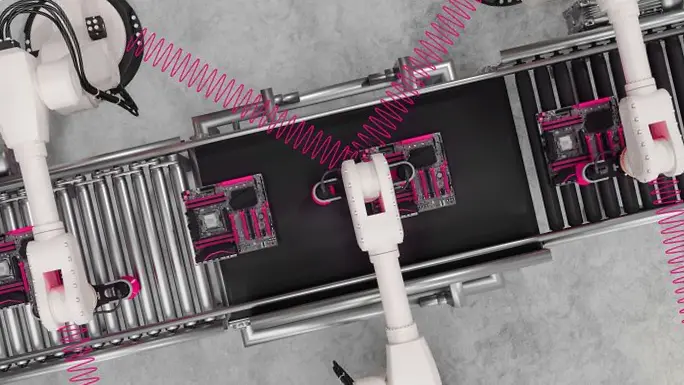
By James Blackman June 13, 2024
Collected at: https://www.rcrwireless.com/20240613/private-5g/deutsche-telekom-offers-private-mmwave-5g-for-industry-4-0-in-germany
Deutsche Telekom has made private 5G available in so-called millimeter wave (mmWave) spectrum at 26 GHz for the first time in Germany. It claims the band allows for round-trip latencies of three to four milliseconds and download and upload data rates of more than four and two gigabits per second, respectively. It is offering mmWave support as part of its ‘campus network’ offer, which has until now used the dedicated 3.7-3.8 GHz mid-band spectrum in Germany.
Higher-band mmWave spectrum offers a shorter coverage range, but a higher bandwidth and higher speeds. In Germany, the 26 GHz band has been allocated exclusively by national telecoms regulator BNetzA to enterprises for localised applications by the Federal Network Agency. It can currently only be used for local applications. Deutsche Telekom said it has now trialled 5G frequencies in the mmWave range at 26 GHz with industrial customers.
The operator said Austria-based metal process manufacturing company Ger4tech Metall & Mechatronik has tested its autonomous machines and robots in the band at the Berlin-based Werner-von-Siemens Centre for Industry and Science, used by the likes of TU Berlin and the Fraunhofer Institute for research and testing. Ericsson has provided a private 5G network at the site. IoT module maker Telit Cinterion has provided a dual-band 3.7 GHz and 26 GHz router.
The Telit module is being offered by Deutsche Telekom to customers, also. A number of Industry 4.0 use cases are available for testing at the site, including autonomous guided vehicles (AGVs) and autonomous mobile robots (AMRs), as well as “other challenges in industrial manufacturing”. Deutsche Telekom said the addition of the 26 GHz band offers industrial enterprises a boost as they look to roll-out data-intensive AI applications.
A statement said: “The 5G mmWave comes into play when the requirements for communication and data transmission increase, and therefore also when solving more complex tasks. For example, in a computer vision application: the robot picks up an order and checks whether the ordered goods are complete on the way to the next destination. If there is a discrepancy, it immediately reorders the goods.”
Klaus Werner, managing director of business customers at Telekom Deutschland, said: “It is important for our industrial customers in the age of artificial intelligence to be able to upload data from machines and thus make it available and analyzable in real time. This is the only way for companies to introduce AI applications sensibly and efficiently and derive great benefits for their business.”
Marco Contento, vice president of product management for mobile broadband at Telit Cinterion, said: “We’re enabling customers to access unparalleled levels of efficiency, productivity and innovation. Through the seamless integration of 5G mmWave into their operations, every device and process can achieve connectivity at an unprecedented scale. Collaboratively, we’re helping to pave the way for industries to streamline operations, anticipate maintenance needs, and a multitude of future possibilities.”

Leave a Reply